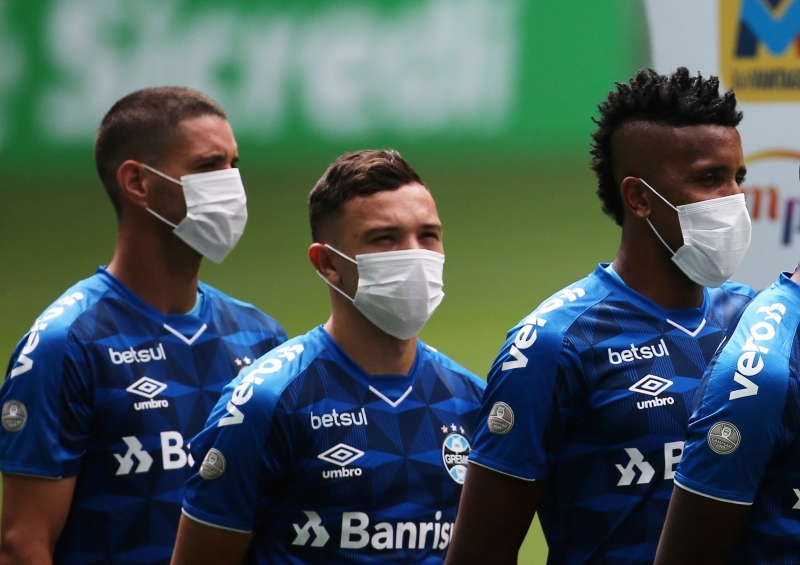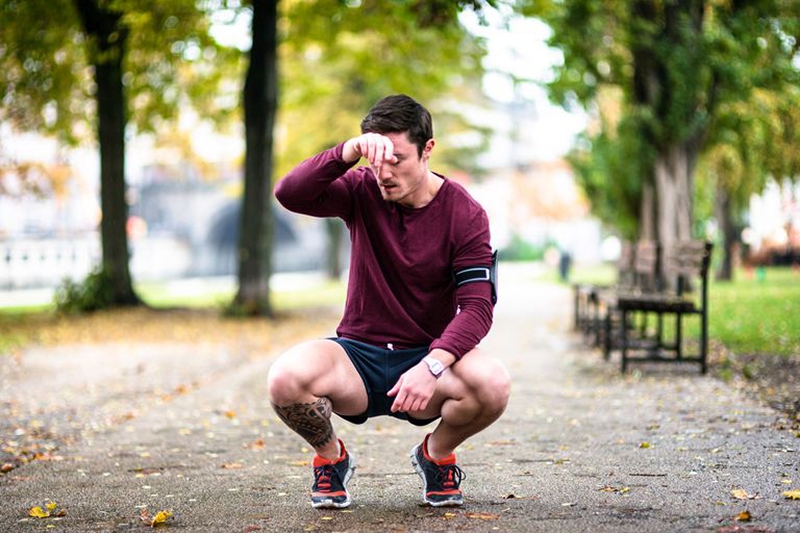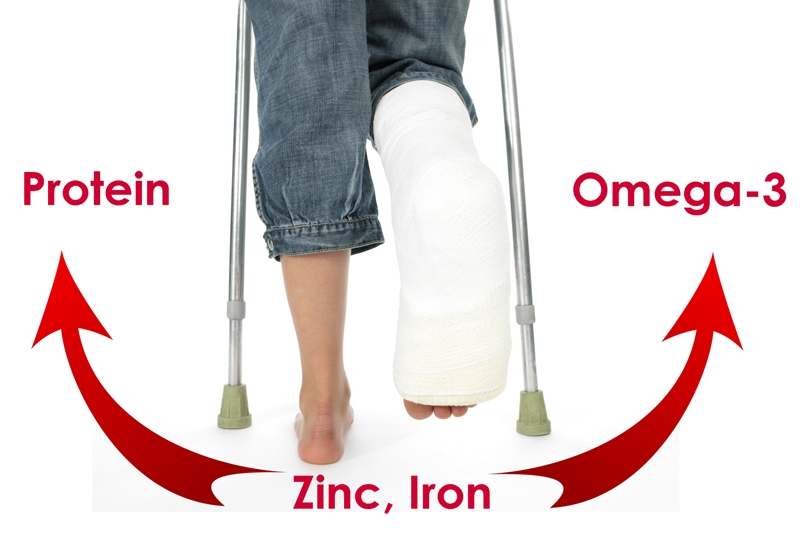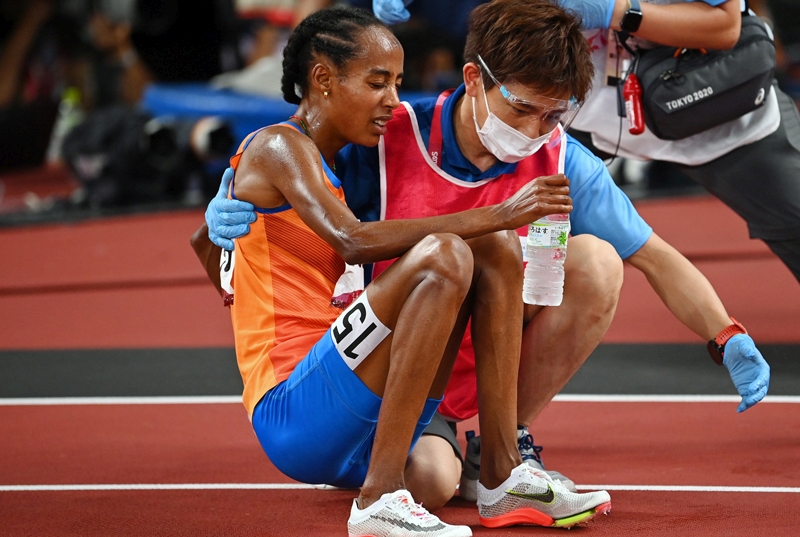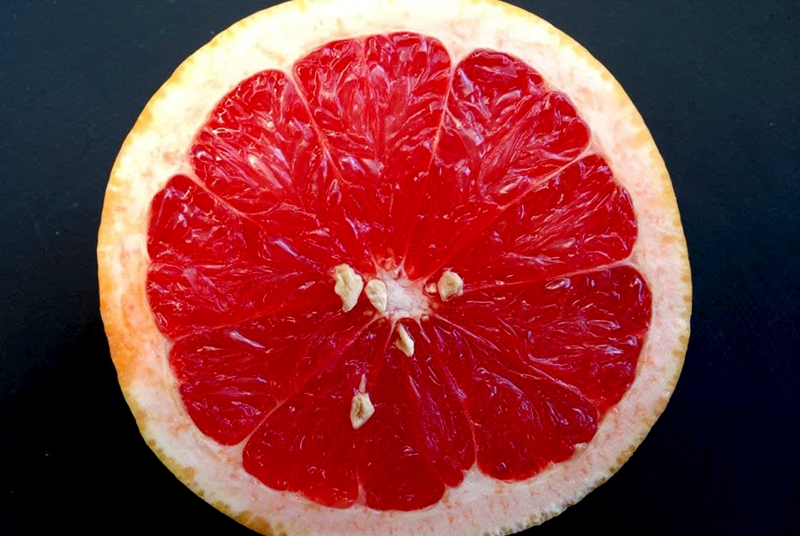You are viewing 1 of your 1 free articles. For unlimited access take a risk-free trial
Antiviral nutrition: arm yourself against respiratory infection!

Can the use of key vitamins and minerals provide antiviral support against respiratory viruses such as COVID-19 and influenza? Andrew Hamilton looks at what the science says, and provides a number of recommendations for athletes (and anyone else) seeking to stay well in these uncertain times
With the exponential growth of the coronavirus pandemic continuing unabated, it may well become a matter of when – not if – you become exposed to the virus. And when that time comes, the lack of treatment options means that having an immune system in tip-top condition will be your best defense. Regular Sports Performance Bulletin readers will already be aware of the proven link between good nutrition and high levels of immunity(1). We also know that nutrient deficiencies or gross malnutrition can harm immune function(2). However, one question that is less clear to many is whether increasing your intake of key nutrients or ingesting other natural compounds (nutraceuticals) can elevate your immune defenses still further?An antiviral armory
In a recent radio interview here in the UK, a senior medical expert stated that ‘so long as there isn’t a nutritional deficiency present, taking extra nutrients or supplements will not improve immune function in any way’. In this article however, we will present good peer-reviewed recent data from the scientific literature which clearly demonstrates that this statement is factually incorrect. Yes, it’s very important that the fundamentals of your day-to-day diet are ensuring you’re eating a nutrient-rich diet (see this article for an overview of what this entails). But it’s equally true than higher than RDA intakes of certain nutrients - and perhaps other naturally-occurring plant compounds - can provide extra nutritional support for an immune system that is fighting a virus.In the paragraphs that follow, we have summarized some of the key findings on nutrients where solid evidence exists for an antiviral effect. Any antiviral effect is of course desirable; if virus replication can be inhibited – even by a modest amount – this can slow the progress of a disease, giving the immune system more time to mount an effective response. Obviously, there are tens of thousands of scientific papers in the literature, so in this article we will focus preferentially on studies that meet the following three criteria:
- Antiviral activity is investigated in the context of acute respiratory infections
- There are a number of studies suggesting potential immunity benefits
- There is some clinical evidence from human or animal studies (ie not just cell culture studies) that these nutrients provide benefits.
*Vitamin D
Vitamin D is a nutrient that we have discussed extensively in other Sports Performance Bulletin articles. Most readers will know that vitamin D is essential for bone health. However, a growing body of evidence has found that optimum intakes of vitamin D in adults provide significant protection from degenerative diseases such as heart disease, multiple sclerosis and a number of different cancers(3,4). In addition, this newer research also suggests that boosting vitamin D intake improves immunity.For example, when scientists studied 267 endurance athletes over the winter period, they found that a significantly higher proportion of those who were vitamin D ‘deficient’ came down with an upper respiratory tract infection (URTI – coughs, colds, sore throats etc) and suffered worse symptoms than those in the ‘optimal’ status group(5). Another study found that supplementing 5000IUs per day with vitamin D₃ for four weeks during the winter boosted immune function and reduced the incidence and severity of URTIs in Taekwondo athletes(6). Other recent studies have provided strong evidence that 1) poor vitamin D status is linked to a higher incidence of URTIs and that 2) increasing vitamin intake, especially over the winter period, reduces the incidence and severity of URTIs(7).
There’s a good theoretical basis for strongly recommending vitamin D supplementation in the current situation. Comprehensive research has found that a vitamin D deficiency has been shown to be independently associated with increased risk of viral acute respiratory infection (ARI) in a number of observational studies(8). And the clinical trials analysed in this research found that vitamin D supplementation demonstrated protective effects in acute respiratory infection. This research is also supported by research that found vitamin D plays a vital role in immunity, particularly for respiratory infections affecting the lungs, and that vitamin D supplementation can reduce the frequency and severity of viral infections of the respiratory tract(9).
If you still need convincing, consider the findings from a large review study, which looked at the relationship between blood levels of vitamin D and the incidence of acute respiratory tract infection(10). Published just a few months ago, this review pooled the data from 14 other studies and found that the lower the level of vitamin D in the blood, the higher the risk of an acute respiratory tract infection, and the more severe it was likely to be. This trend was especially noticeable once blood levels dropped below 37.5ng/L. Given that here in the Northern hemisphere, we are at the end of a long winter, with little or no UV in the sun’s rays to synthesise vitamin D in the skin (the best source of this vitamin), it is likely that many people who do not routinely supplement with vitamin D will currently have poor vitamin D levels, which may be a significant factor in the severity of the coronavirus outbreak.
News update - 5th May 2020: A new study looking at patterns of COVID-19 mortality in Indonesian patient provides further compelling evidence for the importance of vitamin D intake. It found that (when age, sex and pre-existing medical conditions were controlled for) individuals with a deficient vitamin D status were TEN TIMES more likely to die than those with a normal status. You can find the study here.
*Vitamin C
There’s plenty of generalized data that vitamin C is important for modulating immune activity in viral infections of the respiratory tract, albeit it seems to have limited antiviral activity itself. In a 2018 study on vitamin C intakes and status in critically ill patients, researchers concluded that vitamin C deficiency is very common due to increased needs and decreased intake, and that a vitamin C deficiency can aggravate the severity of illness and hamper recovery(11). They also noted that in a number studies involving sepsis (organ shutdown due to extreme stress of infection), vitamin C administered at pharmacological doses attenuates oxidative stress and inflammation, and restores endothelial and organ function.For respiratory infections, it is known that taking extra doses of vitamin C shortens the duration and reduces the severity of the common cold(12). It has also been established that high doses of vitamin C administered intravenously can reduce lung injury and aid recovery in acute respiratory distress syndrome (ARDS – a condition that occurs in severe cases of coronavirus infection)(13). More recent research has suggested that high-dose vitamin C supplementation (administered intravenously) may be a useful therapy for patients with severe respiratory virus infections such as coronavirus(14).
It has also been established that prophylactic prevention of infection requires dietary vitamin C intakes sufficient to ‘saturate’ blood plasma levels - which equates to a minimum of 200mgs per day – in order to optimize cell and tissue levels, and that when treating established infections, significantly higher (gram) doses of vitamin C are needed to compensate for the increased inflammatory response and metabolic demand(15). In summary then, a healthy daily vitamin C intake of at least 200mgs per day is important and the literature supports the rationale of increasing this intake to between 3 and 8 grams per day at the first sign of infection.
*Zinc
Zinc is an incredibly important nutrient in the body, being particularly important for protein turnover and synthesis. Given that each immune cell contains thousands of proteins and that your immune system needs to manufacture hundreds of millions of new immune cells each day, you can understand why zinc is critical for optimum immune function - and why a sub-optimum zinc status will almost certainly impair immunity. In a recent review study on this topic, researchers concluded that ‘An abundance of evidence has accumulated over the past 50 years demonstrating the antiviral activity of zinc against a variety of viruses, and via numerous mechanisms. The therapeutic use of zinc for viral infections such as herpes simplex virus and the common cold has stemmed from these findings(16).’Also, recent research suggests that high zinc levels in the body may dampen the immune system’s cytokine-inflammation response, which is responsible for the (often fatal) ‘cytokine storm’ during severe cases of coronavirus infection(17). While some inflammation in the initial phase of infection is good - because it stimulates a cascade of immune cells to swing into action against the virus - excessive and runaway inflammation can be harmful. In a recent study on therapies for fight coronavirus infection in severely ill patients, researchers reported that zinc may be useful because it inhibits the virus’s RNA polymerase activity and thus hampers replication in cell culture experiments(18). They also noted (as above) that therapeutic doses of zinc can help inhibit of pro-inflammatory cytokines, thus dampening excessive and life-threatening inflammation in severe cases.
*Selenium
Although selenium is an essential trace nutrient, much of the research over recent years into the use of selenium has focused on selenium nanoparticles used in conjunction with antiviral drugs. However, selenium is an important nutrient for immune function in its own right. Research has established that selenium plays important roles in the differentiation and proliferation of T cells – key immune cells that fight infection(19,20). In addition, selenium helps to maintain antibody levels, which means the immune system is able to efficiently recognise and block viral infection should the same virus return(21).Research has also established that selenium supplementation, for the most part, is immuno-stimulatory - measured by a wide range of parameters including T cell proliferation, natural killer cell activity, innate immune cell functions, and many others(22). The notion that selenium can enhance immune response is given added weight by the fact that the activation of human blood leukocytes (important immune cells) has been shown to increase in response to selenium-enriched foods(23), and that vaccine responses against pathogens such as poliovirus have been shown to improve with selenium supplementation(24).
In relation to respiratory viruses, animal studies on avian influenza have demonstrated that supplementation of diets with selenium, can enhance antiviral defense and thus, may have a beneficial effect in controlling viral infections(25). Also (and interestingly in the context of coronavirus), a review study was published last year on the acute use of selenium in septic shock and intensive care patients(26). Using data from 14 other trials, it found that selenium therapy was benefit for sepsis patients with reduced duration of vasopressor (ventilator) therapy, duration in intensive care unit and hospital, and reducing the incidence of ventilator-associated pneumonia. Given that many critical cases of coronavirus may result in sepsis and the need for ventilation, these findings are significant.
News update - 8th May 2020: New research in the American Journal of Clinical Nutrition provides further evidence for the benefits of selenium. It has found a strong correlation between selenium status and clinical outcomes of COVID-19. Patients with the lowest selenium levels were more than 3 times more likely to die from the disease as patients with high levels of selenium in the body. The paper containing this research can be found here.
Practical advice
Let put these findings together to make some practical recommendations. In doing so, we’ll assume that you appreciate that nutrient supplementation is no substitute for a poor diet overall. Please ensure you understand what a good day-to-day diet looks like and your eating habits are tailored to reflect this before thinking about supplementation. Having said that, optimizing your diet might be challenging for many at the moment. Here in the UK for example, many shops are not stocking the normal range or variety of foods – especially fresh foods. This means ensuring a really well-balanced diet is perhaps rather harder than in normal times.With that in mind, here are some nutritional recommendations to help maximize your immunity:
- #Eat the best, most varied diet you can. If fresh fruits and vegetables are in short supply, consider growing some of your own (if this is possible).
- #Take a broad-spectrum multi-vitamin and mineral supplement each day. This will help ‘fill in any gaps’ you might have caused by limitations on what you can get hold of in the shops.
- #Take a vitamin D supplement. Make sure it is in the most biologically active ‘D3’ form (not D2).
- #If you have been supplementing high-dose vitamin D3 through the winter, continue to take 2,000-3,000IUs per day. If you have not been supplementing right through the winter, you are advised to take 5,000IUs per day for a month or two and then reduce to 2,000-3,000IUs per day.
- #During the mid-summer months (June, July, August), reduce your D3 intake to 1,000-2,000IUs per day.
- #Take a daily vitamin C supplement. For general immunity, take 200-500mgs per day. If you are under stress or tired (eg through long work hours), increase to 1,000mgs per day (divided 500mgs morning and evening). If you come down with a viral infection, immediately increase your intake to 3,000mgs (3g) per day. Try and split into more frequent smaller doses (eg 6 x 500mgs spread out). This does can be increased for a short period of time to 8g per day if you become very poorly and develop a high temperature (over 38C/100.4F). Be aware that you might develop loose stool movements at this dose.
- #Take a daily zinc supplement. A good multi-vitamin/mineral should contain 13-15mgs of zinc. However, for maximum immunity, this can be topped up to 30mgs per day (ie an extra 15mgs or so). In the case of acute viral infection, fever and severe illness, zinc intake can be increased to 50mgs per day for a short period of time.
- #Take a daily selenium supplement. A good multi-vitamin/mineral should contain around 50mcgs of selenium. This can be topped up by another 50mcgs to around 100mcgs per day. However, don’t fall into the ‘if some is good, more is better’ trap. Long-term selenium intakes above 100mcgs per day may be counterproductive for health unless there is a known selenium deficiency(27).
- Nutr Hosp. 2015 Feb 26;31 Suppl 3:145-54
- Clin Infect Dis. 2008 May 15;46(10):1582-8
- Mol Nutr Food Res. 2010 Aug;54(8):1164-71
- BMJ 2014;348:g1903
- Exerc Immunol Rev. 2013;19:86-101
- Int J Environ Res Public Health. 2018 Sep 14;15(9). pii: E2003
- J Nutr Health Aging. 2018;22(4):491-500
- Nutrients. 2015 May 29;7(6):4240-70
- Rev Med Virol. 2017 Jan;27(1)
- Int J Environ Res Public Health. 2019 Aug 21;16(17). pii: E3020
- Curr Opin Crit Care. 2018 Aug;24(4):248-255
- Biomed Res Int. 2018; 2018: 1837634
- World J Crit Care Med. 2017 Feb 4; 6(1): 85–90
- Intensive Care Med. 2020; 46(2): 315–32
- Ann Surg. 2002;236:814–822
- Adv Nutr. 2019 Jul 1;10(4):696-710
- Nat Commun. 2017; 8: 15245
- Indian J Pharmacol. 2020 Jan-Feb; 52(1): 1–5
- Home Health Care Manag. Pract. 2017;29:199–202
- Arch. Intern. Med. 2007;167:148–154
- Food Agric. Immunol. 2016;27:205–229
- Antioxid Redox Signal. 2012 Apr 1; 16(7):705-43
- Mol Nutr Food Res. 2014 Dec; 58(12):2350-7
- Am J Clin Nutr. 2004 Jul; 80(1):154-62
- Vet Immunol Immunopathol. 2019 Jan;207:62-68
- Medicine (Baltimore). 2019 Mar; 98(9): e14733
- Hormones (Athens). 2020; 19(1): 9–14
Newsletter Sign Up
Testimonials
Dr. Alexandra Fandetti-Robin, Back & Body Chiropractic
Elspeth Cowell MSCh DpodM SRCh HCPC reg
William Hunter, Nuffield Health
Newsletter Sign Up
Coaches Testimonials
Dr. Alexandra Fandetti-Robin, Back & Body Chiropractic
Elspeth Cowell MSCh DpodM SRCh HCPC reg
William Hunter, Nuffield Health
Keep up with latest sports science research and apply it to maximize performance
Today you have the chance to join a group of athletes, and sports coaches/trainers who all have something special in common...
They use the latest research to improve performance for themselves and their clients - both athletes and sports teams - with help from global specialists in the fields of sports science, sports medicine and sports psychology.
They do this by reading Sports Performance Bulletin, an easy-to-digest but serious-minded journal dedicated to high performance sports. SPB offers a wealth of information and insight into the latest research, in an easily-accessible and understood format, along with a wealth of practical recommendations.
*includes 3 coaching manuals
Get Inspired
All the latest techniques and approaches
Sports Performance Bulletin helps dedicated endurance athletes improve their performance. Sense-checking the latest sports science research, and sourcing evidence and case studies to support findings, Sports Performance Bulletin turns proven insights into easily digestible practical advice. Supporting athletes, coaches and professionals who wish to ensure their guidance and programmes are kept right up to date and based on credible science.
